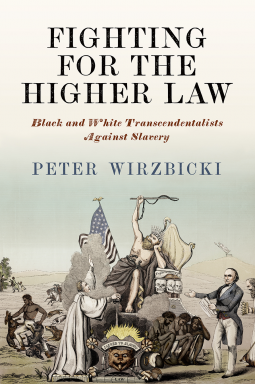
Fighting for the Higher Law
Black and White Transcendentalists Against Slavery
by Peter Wirzbicki
This title was previously available on NetGalley and is now archived.
Send NetGalley books directly to your Kindle or Kindle app
1
To read on a Kindle or Kindle app, please add kindle@netgalley.com as an approved email address to receive files in your Amazon account. Click here for step-by-step instructions.
2
Also find your Kindle email address within your Amazon account, and enter it here.
Pub Date Mar 26 2021 | Archive Date Mar 03 2021
Talking about this book? Use #FightingfortheHigherLaw #NetGalley. More hashtag tips!
Description
In Fighting for the Higher Law, Peter Wirzbicki explores how important black abolitionists joined famous Transcendentalists to create a political philosophy that fired the radical struggle against American slavery.
In the cauldron of the antislavery movement, antislavery activists, such as William C. Nell, Thomas Sidney, and Charlotte Forten, and Transcendentalist intellectuals, including Ralph Waldo Emerson and Henry David Thoreau, developed a "Higher Law" ethos, a unique set of romantic political sensibilities—marked by moral enthusiasms, democratic idealism, and a vision of the self that could judge political questions from "higher" standards of morality and reason. The Transcendentalism that emerges here is not simply the dreamy philosophy of privileged white New Englanders, but a more populist movement, one that encouraged an uncompromising form of politics among a wide range of Northerners, black as well as white, working-class as well as wealthy. Invented to fight slavery, it would influence later labor, feminist, civil rights, and environmentalist activism.
African American thinkers and activists have long engaged with American Transcendentalist ideas about "double consciousness," nonconformity, and civil disobedience. When thinkers like Martin Luther King, Jr., or W. E. B. Du Bois invoked Transcendentalist ideas, they were putting to use an intellectual movement that black radicals had participated in since the 1830s.
Advance Praise
"In these pages, with an eloquence worthy of William Cooper Nell and Ralph Waldo Emerson, Peter Wirzbicki urges us to hear the hidden harmonies between abolitionist and Transcendentalist thought, while never failing to notice the dissonances, too. This is an inspiring book that ranges as widely as the thinkers it follows. It demonstrates anew why intellectuals and the life of the mind mattered in the struggle to end slavery."—Caleb McDaniel, Pulitzer Prize-winning author of Sweet Taste of Liberty
"Peter Wirzbicki brilliantly rescues Transcendental abolitionists from the caricatures and myths that surround their history. Perhaps the most original contribution he makes is to foreground the forgotten intellectual and political contributions of African American Transcendentalists. This astute book will forever change the way we think about Transcendentalism and foreground its antislavery contributions to the American radical democratic imagination."—Manisha Sinha, author of The Slave's Cause: A History of Abolition
Available Editions
| EDITION | Other Format |
| ISBN | 9780812252910 |
| PRICE | $39.95 (USD) |
Featured Reviews
I received an electronic ARC of this book via NetGalley.
This is a really fascinating book about the interplay between the Transcendentalist and abolitionist movements in New England in the decades before the Civil War.
It's not a quick read, but it is accessible to a non-specialist, engaging, and like I said--it's genuinely interesting stuff. While much of the focus is on the philosophical contributions of transcendentalism to New England abolitionists, it also addresses some of the more general interactions between a variety of intellectual movements in the mid-19th century both in the US and in Europe.
While I suspect some background knowledge of 19th century intellectual history is probably beneficial in getting the most out of this book, the author does a good job of introducing most of the concepts and individuals he discusses. It's thought-provoking and informative, and ultimately, the philosophical and ideological underpinnings of these 19th century movements remain relevant today.



